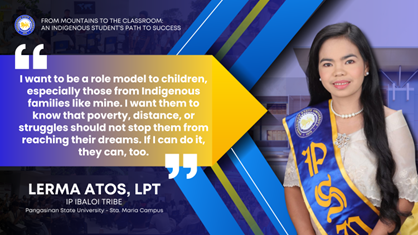Growing up in a remote, mountainous area between Itogon and Pangasinan, Lerma Atos, a proud member of the Ibaloi tribe, knew early on that life would not be easy. At 27 years old, she now stands as a licensed professional teacher—proof that dreams can come true, no matter where you come from.
Lerma was raised by her parents, both hardworking farmers, who taught her the value of perseverance. “We didn’t have much, but my parents gave everything they could to send me to school. Their sacrifices kept me going,” Lerma shares.
Being part of an Indigenous community brought unique challenges. Living far from school and in an area with limited resources made her educational journey even more difficult. For Lerma, getting an education meant leaving her family and staying closer to campus.
During the pandemic, when classes shifted online, the struggles became greater. Their home had no internet signal, so Lerma climbed up a nearby mountain just to attend her classes. “I spent whole days on the mountain, sitting on the grass and waiting for classes to finish. I brought food because going back home wasn’t possible. Sometimes I even napped on the ground while waiting for the next subject,” she recalls.
Rainy days were the worst. Weak signal, cold winds, and exhaustion would overwhelm her. “I wanted to cry. There were moments I felt like giving up,” Lerma admits. But her family’s words of encouragement, her faith in God, and her own determination kept her going. “I reminded myself why I started this journey—to become a teacher and give back to my community.”
Lerma credits Pangasinan State University – Sta. Maria Campus for playing a huge role in her success. The university welcomed her as an Indigenous student, providing an inclusive environment where she could grow and pursue her dreams. “My teachers were not only mentors—they were my support system. They encouraged me when things were hard and helped me believe that I could achieve my goals,” Lerma says. The university’s commitment to accessible education gave her a chance to succeed, even when life seemed unfair.
After graduating, Lerma prepared for the Licensure Examination for Teachers (LET). To support herself, she worked as a babysitter while reviewing for the exam. It was another difficult chapter, but she never gave up. When the results were released and Lerma saw her name on the list of LET passers, she was overwhelmed with joy.
“I cried when I saw my name. It felt unreal, but I knew that God had answered my prayers. All the sacrifices, the struggles, and the sleepless nights were worth it,” she shares with a smile.
Now a licensed teacher, Lerma is determined to give back to her community and inspire other Indigenous youth. “I want to be a role model to children, especially those from Indigenous families like mine. I want them to know that poverty, distance, or struggles should not stop them from reaching their dreams. If I can do it, they can, too.”
Her message to young people is heartfelt: “Work hard for your dreams. Life will not always be easy, but you must keep going. If you’re tired, rest—but don’t give up. Trust in yourself, trust in God, and remember that hardships will make you stronger.”
Lerma Atos’ success is a powerful story of resilience, faith, and hope. Her struggles as a member of an Indigenous community remind us of the barriers many students face, but her triumph shows that with the right support, anything is possible.
Pangasinan State University – Sta. Maria Campus takes pride in being part of Lerma’s journey. The university’s commitment to inclusivity and accessible education allowed her to overcome challenges and fulfill her dream. Lerma’s story is a testament to the power of education to change lives and inspire generations to come.
From the mountaintops she once climbed to attend classes to the classroom she now calls home, Lerma’s journey is a shining example of hard work, hope, and the belief that no dream is too far to reach.
